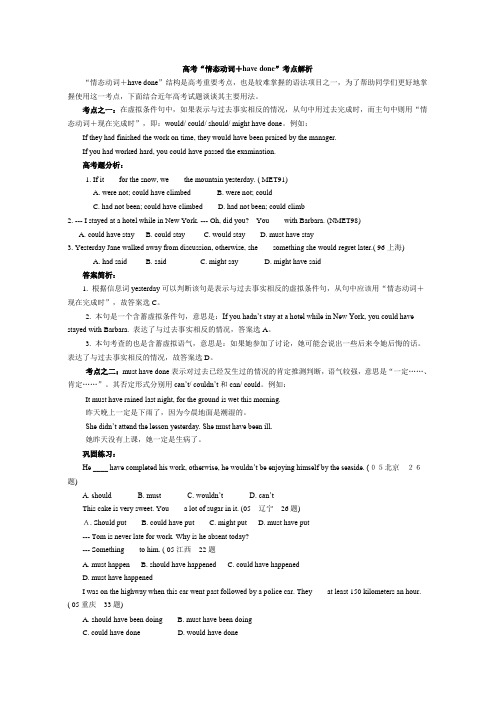“情态动词+have-done”讲解
- 格式:ppt
- 大小:947.50 KB
- 文档页数:34

情态动词+have done:对过去行为或动作表示推测、评论或判断一、虚拟语气1、should have done:过去本应该做某事却未做否定结构should‘t have done:过去本不该做某事却做了2、ought to have done:过去本应该做某事却未做否定结构oughtn‘t to have done:过去本不该做某事却做了3、need have done:过去本有必要做某事却未做否定结构needn‘t have done:过去本没必要做某事却做了4、could(不能用can)have done:过去本能够做某事却未做否定形式couldn‘t have done没有虚拟语气的用法couldn’t have done只能表推测,=can’t have done:过去不可能做了某事5、might(不能用may)have done:过去本可以做某事却未做否定形式might not have done没有虚拟语气的用法。
might not have done只能表推测,=may not have done:过去可能没有做某事二、推测1、must have done:过去肯定做了某事。
不存在mustn’t have done的形式。
否定或疑问形式须用can(could) have done(不可能,肯定不会)来表示。
2、may/might have done :过去可能做了某事may比might 表示的可能性在说话人看来稍大些。
may/might not have done:过去可能没有做某事3、can/could have done:can have done一般用在否定句和疑问句中,表示不相信或怀疑的态度。
could have done还可以用于肯定句,表示本来可能完成而实际未完成。
PS: 表示推测过去某动作发生的可能性时,就表示的可能性程度而言:mus t>could>may>might 情态动词的回答方式:。

情态动词+have+done是历年高考的重点和难点之一,现将其用法总结归纳如下:一、must+have+done表示对过去事情的肯定推测,译成“一定做过某事”,该结构只用于肯定句.1. It must have rained last night, for the ground is wet. 昨晚一定下雨了,因为地面还是湿的2. You must have been mad to speak to the servant.你和仆人说话,一定是发疯了二、“can't+have+done”表示对过去事情的否定推测,译成“不可能做过某事”。
1. Mr. Smith can't have gone to Beijing, for I saw him in the library just now. 史密斯先生不可能去北京了,我刚才还在图书馆见过他。
2.Mary can't have stolen your money. She has gone home.玛丽不可能偷你的钱,她回家去了三、“can+have+done”表示对过去行为的怀疑,用于疑问句,译成“可能做过……吗?”。
1.There is no light in the room. Can they have gone out?屋里没有灯,他们可能出去了吗?2. There is nowhere to find them. Where can they have gone? 到处找不到他们,他们可能到什么地方去呢?四、could+have+done’是虚拟语气,表示对过去事情的假设,意思是本来能够做某事而没有做.He could have passed the exam, but he was too careless.本来他能通过考试,但他太粗心五、“may+have+done”表示对发生过的事情的推测,意思是“可能已经”或“也许已经”,用于肯定句中。

高考“情态动词+have done”考点解析“情态动词+have done”结构是高考重要考点,也是较难掌握的语法项目之一,为了帮助同学们更好地掌握使用这一考点,下面结合近年高考试题谈谈其主要用法。
考点之一:在虚拟条件句中,如果表示与过去事实相反的情况,从句中用过去完成时,而主句中则用“情态动词+现在完成时”,即:would/ could/ should/ might have done。
例如:If they had finished the work on time, they would have been praised by the manager.If you had worked hard, you could have passed the examination.高考题分析:1. If it ___ for the snow, we ___ the mountain yesterday. ( MET91)A. were not; could have climbedB. were not; couldC. had not been; could have climbedD. had not been; could climb2. --- I stayed at a hotel while in New York. --- Oh, did you? You ___ with Barbara. (NMET98)A. could have stayB. could stayC. would stayD. must have stay3. Yesterday Jane walked away from discussion, otherwise, she ___ something she would regret later.( 96上海)A. had saidB. saidC. might sayD. might have said答案简析:1. 根据信息词yesterday可以判断该句是表示与过去事实相反的虚拟条件句,从句中应该用“情态动词+现在完成时”,故答案选C。

情态动词+have done的构成及用法含译文1.情态动词+have done的构成may/might have done可能已经发生了某事could have done本能够做某事can't/couldn’t have done不可能已经发生了某事must have done一定已经发生了某事would have done本来会做某事should/ought to have done本应该做某事但没有做shouldn't/oughtn't to have done本不应该做某事但做了need have done本需要做某事但没有做needn't have done 本不需要做某事但做了2.情态动词+have done的用法情态动词+have done的用法主要包括两个方面:一.表示对过去所发生事情的推测或假设;二.表示对过去所发生事情的责备或遗憾。
①may/might have done可能已经发生了某事。
对过去所发生动作的不太肯定的推测。
用于肯定句中,may和might意思相同,但might 可能性更小,多用于虚拟语气中。
By expressing love for his children in such a special way, Tolkien may indeed have been the real Father Christmas. 通过这种特别的方式表达对孩子们的爱,托尔金可能真的是真正的圣诞老人。
(新外研版必修二)You can check his office. He might have been there already. 你可以去他的办公室看看。
他可能已经到那儿了。
If he had been given more encouragement, he might have made greater progress. 如果给他更多的鼓励,他可能会取得更大的进步。


情态动词+have done (have been doing )一、教学目标情态动词+have done (have been doing ) 的用法二、生成问题情态动词+have done (have been doing ) 的用法有哪些1、should(ought to)+have done (have been doing )表示“本来应该做而实际上没做”,其否定式表示“本来不该做却做了”,常含有责备的语气。
You should have been here five minutes ago.五分钟之前你就应该到这里了。
How I regretted the days when I had played and should have studied.我多么懊悔我本应该好好学习的日子都玩掉了。
We shouldn’t have been resting so long.我们真不该休息这么长时间。
2、《3、could+have done表示“本来有能力做而实际上没有做”。
—We could have walked to the station, it was so near.这么近,我们完全能走着来车站。
—Yes. A taxi was not at all necessary.是呀,根本不必搭车的。
I could have won if I hadn’t fallen over.要不是摔倒,我准能赢。
3、needn’t+have done表示“本来不必做的事,实际上做过了”。
I got up early, but needn’t have done so, because I had nothing to do that morning.那天早上我起得很早,可我根本不必起这么早,因为我无事可做。
You needn’t have written such a long article. The teacher only asked for 300 words, and you have written 600 words.你没有必要写这么长的文章,老师只要求写300字,你写了600字。
总结:情态动词+have done 的区别1、must+have +done只用于肯定句:表对过去情况的肯定推测,意思是“想必/准是/一定做过某事”--Tom must have gone to New York. 汤姆一定已去纽约了。
---No,he can't. I saw him on the street just now. 不,不可能。
我刚才在街上看到他。
2、should/ought to + have done①肯定句:表“本应该做某事,而实际未做”,含责备或遗憾之意②否定句:表“本不应该做某事,而实际做了”3.need have done①肯定句:本需要做某事,而实际未做②否定句:本不必做某事,而实际做了4.may/might have done①肯定句:表对过去的推测,“过去可能做过某事”,might可能性更小②否定句:表对过去的推测,“过去可能没有做过某事”③虚拟语气:might have done, 表示“本可以做某事,而实际未做”Eg. She might have called for help. 她有可能会呼救的。
(事实上并没有呼救)You might both have been caught and killed. 你们俩都可能被抓住杀掉。
(事实上并没有被抓住杀掉)5.can/could have done①肯定句:表对过去的推测,“过去可能做过某事”,could可能性更小②否定句:表对过去的推测,“过去不可能做过某事”③疑问句:提出质疑,表示“可能会做某事”Eg. Where can she have gone? 她会去哪儿呢?Could you have left your book on the bus?你会不会把书落在了公交车上呢?④虚拟语气:could have done 表示“可能发生某事,但实际未发生”eg.You were stupid to go skiing there---you could have broken your leg.你到那个地方去滑雪真傻,你可能会摔断腿的。